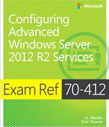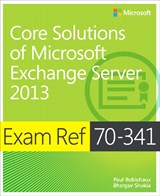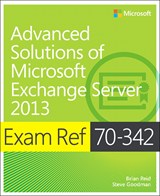MCSE: Messaging Course + Exam
MCSE: Messaging Certification
Microsoft training and certification empowers the IT professionals to expand their skills and gain knowledge directly from the source. Earning the Microsoft Certified Solutions Expert (MCSE R2): Messaging certification proves that the individual has the core skills to manage an infrastructure. Getting certified with messaging validates candidate’s ability to configure, install, and support Exchange messaging deployments in a real-world business context.
Achieving MCSE R2: Messaging certification confirms your knowledge of configuring and deploying client access services, planning mailbox servers, designing exchange integration within the current infrastructure, planning message transport in Exchange 2010, backup, recovery and maintaining high availability. It also validates your understanding in unified messaging, security, archival, and enterprise deployments.
Getting certified with Microsoft’s certifications will not only help you get a real push in your career but also enable you to grow and evolve as the technology advances, making your career recession proof and secure.
This certification is a key requirement for the following jobs:
- Systems Administrator
- Level 1–2 Support Desk
- Service Desk Analyst
- Technical Consultant
- System Support Officer
- IT Support Engineer and other Microsoft Client/Server related jobs
Exposure to Microsoft Server technologies
Candidates can achieve this certification by passing the following exam(s).
- Microsoft 70-410
- Microsoft 70-411
- Microsoft70-412
- Microsoft70-341
- Microsoft70-342
The certification exam can be registered and attempted within 3 months of course/module completion at Logitrain training centre on weekdays during normal business hours (excludes public holidays)
- Installing and Configuring Windows Server 2012
- Administering Windows Server 2012
- Configuring Advanced Windows Server 2012 Services
- Core Solutions of Microsoft Exchange Server 2013
- Advanced Solutions of Microsoft Exchange Server 2013





(Logitrain Course material provided)
- Windows Server 2012 installation and configuration
- Windows Server 2012 Roles and Features configuration
- Windows Server 2012Hyper-V configuration
- Active Directory installation and configuration
- Deploying, Managing, and Maintaining Windows Server 2012
- Network Services and Access configuration
- Network Policy Server Infrastructure configuration
- Configurating and Managing Active Directory
- Configurating and Managing Group Policy
- Configuring and Managing High Availability
- File and Storage Solutions configuration
- Business Continuity and Disaster Recovery implementation
- Network Services configuration
- Identity and Access Solutions configuration
- Plan, Install, Configure, and Manage Transport
- Install, Configure, and Manage the Mailbox Role
- Plan, Install, Configure, and Manage Client Access
- Design and Manage an Exchange Infrastructure
- Configure, Manage, and Migrate Unified Messaging
- Design, Configure, and Manage Site Resiliency
- Design, Configure, and Manage Advanced Security
- Configure and Manage Compliance, Archiving, and Discovery Solutions
- Implement and Manage Coexistence, Hybrid Scenarios, Migration, and Federation
This course is likely to add to the employment related skills of the participants. The skills developed are likely to be used in the course of being an employee or working in a business.
- University students
- Helpdesk operators
- Candidates entering IT job market
- First-level network support staff
- System engineers and account managers
- Individuals seeking MCSA certification
- Prepare Windows Server 2012 installation
- Work with Windows Server 2012 roles
- Using Features on Demand
- Migrating roles from previous versions of Windows Server
- Prepare Windows Server 2012, installing Server Core
- Windows Server 2012 Core Configuration
- Work with delegations
- Windows Server 2012 Core Conversion to/from full GUI
- Configuring services and NIC teaming
- Manage features in offline images
- Work with remote servers to deploy roles
- Working with storage spaces, basic disks and dynamic disks
- MBR and GPT disks configuration
- Work with volumes disk pools and storage pools
- WinRM
- Server management: Day-to-day tasks,multi-server and down-level tasks
- Windows Server 2012 Server Core configuration
- Windows Firewall configuration
- Working with dynamic memory
- smart paging, Resource Metering and guest integration configuration
- VHDs and VHDX
- Differencing drives configuration
- VHDs configuration
- pass-through disks,snapshots, virtual Fibre Channel adapter
- Global catalog server configuration
- DNS SRV record registration issues
- Adding, removing and upgrading a domain controller
- Active Directory Domain Services installation
- Working with Data Collector Sets
- Manage alerts,real-time performance
- Virtual machines
- Events monitoring,subscriptions
- Network monitoring
- Implementing the requirements of the Server
- implementing the configuration of the client
- Working with DNS for Direct Access, certificate configuration
- Working with System Health Validators
- Health policies configuration
- Enforcing NAP using DHCP and VPN
- Isolating and remediating non-compliant computers using DHCP and VPN
- NAP client settings configuration
- UGMC configuration
- RODC installation and configuration
- Domain Controller cloning
- Active Directory and SYSVOL backup
- Working with an offline Active Directory
- managaing Active Directory database. snapshots and restore
- Block inheritance
- Manage processing order and precedence
- Configure enforced policies
- Working with security and WMI filtering
- Configuring loopback and slow-link processing
- Manage client-side extension
- Manage cluster networking
- Quorum
- Restore single node or cluster configuration
- Mangage cluster storage: restoring, implementing and upgrading
- Manage role-specific settings
- VM monitoring
- Mangage failover and preference settings
- Perform live, quick and storage migration
- Import, export, and copy VMs
- Other platforms migration
- Managing changes to policy and staging
- Mange claim types of users and devices
- Remediation of access-denied
- Work with file classification
- Manage Windows Server backups: Online and role-specific backups
- Work with VSS settings through VSSAdmin
- System Restore snapshots
- Work with Hyper-V Replica
- Manage multi-site clustering, network settings, Quorum, and failover settings
- Manual configuration of IPAM
- Using Group Policy to configure IPAM
- Manage server discovery
- Work with IP blocks and ranges
- Manage IP address space utilization
- Migrate, delegate and manage IPAM
- Authenticating using claims-based
- Relying Party Trusts
- Manage the rules of the Claims Provider Trust
- Active Directory Lightweight Directory Services (AD LDS) attribute stores
- AD FS certificates
- AD FS proxy
- Plan a high availability solution for common scenarios
- Design a transport solution
- Configure and manage transport
- Troubleshoot and monitor transport
- Configure and manage hygiene
- Plan the mailbox role
- Configure and manage the mailbox role
- Deploy and manage high availability solutions for the mailbox role
- Monitor and troubleshoot the mailbox role
- Develop backup and recovery solutions for the mailbox role and public folders
- Create and configure mail-enabled objects
- Manage mail-enabled object permissions
- Plan, deploy, and manage a Client Access Server (CAS).
- Plan and configure namespaces and client services.
- Deploy and manage mobility solutions.
- Implement load balancing.
- Troubleshoot client connectivity
- Plan for impact of Exchange on Active Directory directory services
- Administer Exchange Workload Management
- Plan and manage Role Based Access Control (RBAC)
- Design an appropriate Exchange solution for a given SLA
- Configure Unified Messaging (UM)
- Manage Unified Messaging
- Troubleshoot Unified Messaging
- Migrate Unified Messaging
- Manage a site-resilient Database Availability Group (DAG)
- Design, deploy, and manage a site resilient CAS solution
- Design, deploy, and manage site resilience for transport
- Troubleshoot site resiliency issues
- Select an appropriate security strategy
- Evaluate RBAC, Evaluate BitLocker, Evaluate Smart Cards, Evaluate IRM, Evaluate S/MIME, Evaluate Domain Secure/TLS
- Deploy and manage Information Rights Management (IRM) with Active Directory Rights Management Services (AD RMS)
- Create an AD RMS template
- Create transport protection rules
- Create Microsoft Outlook protection rules
- Configure and interpret mailbox and administrative auditing
- Configure mailbox audit logging
- Configure administrative audit logging
- Troubleshoot security-related issues
- Select an appropriate security strategy
- Deploy and manage Information Rights Management (IRM) with Active Directory Rights Management Services (AD RMS)
- Configure and interpret mailbox and administrative auditing
- Troubleshoot security-related issues
- Configure and manage an archiving solution
- Design and configure Data Loss Prevention (DLP) solutions
- Configure and administer Message Records Management (MRM)
- Perform eDiscovery
- Implement a compliance solution
- Establish coexistence with Exchange Online
- Deploy and manage Exchange Federation
- Implement on-premises coexistence with legacy systems
- Set up a cross-forest coexistence solution
- Migrate legacy systems

Includes Official Exam Fee
Take the certification exam within 3 months of course / module completion

100% Money Back Guarantee
Training fee is fully refundable if you are not satisfied with the training

Includes Course Material
Course material in hardcopy is included for you to keep for reference and support

Includes Practise Questions
Practise questions are included to assist you in preparing for the official exam

Highly Skilled Trainers
Our trainers are highly skilled with expertise and extensive hands-on experience

Our Price Beat Guarantee
Relax, we will beat competitor’s advertised price. Our course has no extra costs
| Location | Type | Duration | Price | Dates | |
|---|---|---|---|---|---|
| Location | Type | Duration | Price | Dates |















Accreditations
OUR SATISFIED CUSTOMERS
| Approachable and knowledgeable; comfortable surroundings. Logitrain does make IT training easier |
I recently followed the ITIL Foundation course at Logitrain. The training, materials and facilities were excellent and I would not hesitate to train with Logitrain again.
Thanks for a great week! Really enjoyed and feel I picked up a lot. Great Trainer! Will definitely look at further studies here.
Well-presented and able to convey immense knowledge to class. All queries were responded to promptly.
Excellent teaching method, easy to understand.
Logitrain provided a valuable insight into ITIL and enabled me to excel and advance my knowledge through a simple and well organised series of sessions.
Great place to study for certification, knowledgeable persons, excellent customer service. Ready to answer queries on the spot, very helpful.
The trainer was very patient and gave everybody the opportunity to participate.
The trainer explained everything very well. Logitrain was very helpful for me in getting a better overall understanding of CCNA. I previously had studied it 2 years earlier but required revision












